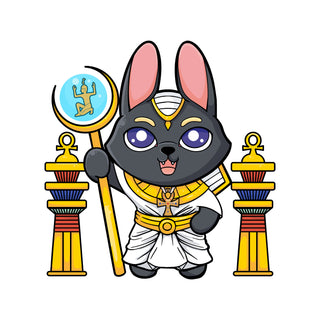REGULAR PRICE $104.95ea - SAVE over 10% WHEN YOU PURCHASE THE SET!
SET OF FOUR Canopic Jars featuring the four Sons of Horus: Imset, Hapi, Qebehsenuef & Duamutef. Lovingly hand-made in Egypt, these beautiful reproductions are sure to be a centerpiece in any location!
In Egyptian mythology, Imset (also transcribed Imseti, Amset, Amsety, Mesti, and Mesta) is a funerary deity and one of the Four Sons of Horus.
He is associated with the canopic jars, specifically the one that contained the liver. Because the Egyptians saw the liver as the seat of human emotion, the depiction of Imset was, unlike his brothers, not associated with any animal but always depicted as a mummified human.
Isis was considered his protector, and Imset himself was recognized as the patron of the direction of the south. Imset was also associated with a broken heart or death due to excess of emotions, thus his name being translated as "the kindly one" in ancient Egyptian.
Hapi is the baboon headed son of Horus protected the lungs of the deceased and was in turn protected by the goddess Nephthys.
The spelling of his name includes a hieroglyph which is thought to be connected with steering a boat, although its exact nature is not known. For this reason he was sometimes connected with navigation, although early references call him the great runner: "You are the great runner; come, that you may join up my father N and not be far in this your name of Hapi, for you are the greatest of my children – so says Horus"
Qebehsenuef was the falcon-headed son of Horus, and protected the intestines of the deceased. He was in turn protected by the goddess Serket.
His role was to refresh the dead person, and his name means literally "he who libates his siblings". Horus commands him, "Come refresh my father; betake yourself to him in your name of Qebehsenuef. You have come that you may make coolness for him after you ... "
Libation or showering with cool water was a traditional form of worship in Ancient Egypt. There are many images of the pharaoh presenting libation to the gods. There is a sense of a dual function of cleansing and refreshing them.
Duamutef, the jackal-headed son of Horus, protected the stomach of the deceased and was in turn protected by the goddess Neith. It seems that his role was to worship the dead person, and his name means literally "he who worships his mother". In the Coffin Texts Horus calls upon him, "Come and worship my father N for me, just as you went that you might worship my mother Isis in your name Duamutef."
The name Duamutef means "He who adores his mother". In war, the most frequent cause of death was from injuries in the torso and stomach. The deity protecting this organ was associated with death by war and gained the name Duamutef, meaning "adoring his motherland". Duamutef was originally represented as a man wrapped in mummy bandages. From the New Kingdom onwards, he is shown with the head of a jackal. In some cases his appearance is confused or exchanged with that of Qebehsenuef so he has the head of a falcon and Duamutef has the head of a jackal.
Duamutef usually was depicted on coffins and as the lid of canopic jars. Many images of the Judgement of the Dead show him together with his brothers in front of Osiris on a small lily flower.
Dimensions:
Total Height: 26cm / 10 inches (Duamutef taller by 1" / 2cm)
Total Width: 11.5cm / 4.5 inches
Total Depth: 11.5cm / 4.5 inches











